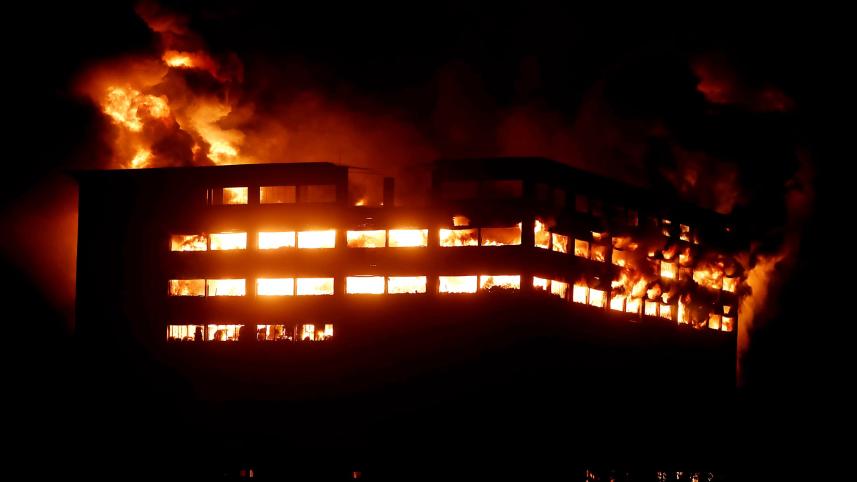Businesses alarmed by repeated fires

- Fires at factories, airport rattle business confidence
- Port tariff hike sparks strikes, halts cargo
- Labour unrest forces closures in Chattogram EPZ
- Leaders warn instability threatens fragile economy
A series of fires, strikes at Chattogram port, and labour agitation at factories have shaken the business sentiment, leaving entrepreneurs anxious about what might come next.
Business leaders say these events have hit at a time when economic activity was already subdued by stubbornly high inflation and political uncertainty. They fear that repeated disruptions, coupled with slow responses to emergencies, are further undermining confidence.
"The situation seems to be turning hostile for businesses," said Anwar-Ul-Alam Chowdhury (Parvez), president of the Bangladesh Chamber of Industries.
On Tuesday last week, a fire tore through a factory and warehouse in Mirpur area of the capital, killing at least 16 workers.
Two days later, another blaze severely damaged a multi-storey factory building in the Chattogram Export Processing Zone (EPZ). Firefighters battled for 17 hours before bringing the flames under control.
A massive fire broke out at the cargo village of Dhaka airport yesterday afternoon. Firefighters were still dousing the blaze as of 8:30pm.
To compound matters, a 41 percent tariff hike at Chattogram port prompted strikes by prime mover and truck drivers, bringing the movement of goods at the main seaport to a standstill.
On Thursday, labour agitation forced the closure of eight factories in Chattogram EPZ, while automobile traders yesterday announced protests over alleged extortion and poor security.
Linking the chain of events, Parvez said, "Chattogram port has increased tariffs, and just today, there was a fire at Dhaka airport. One wonders, are these coincidences, or is there something more? I can't tell."
He said the string of incidents has rattled business confidence. "Now people are genuinely concerned. When fires break out in supposedly secure locations like Mirpur, or inside EPZs where everyone feels safe, it raises serious questions."
Describing the unsettling sequence, the business leader said, "A fire burns for 17 hours in one place, and then another factory is shut down. Before one incident is even resolved, there is another one, and today it is the airport."
He also pointed to the implications of the airport fire, where key garment industry materials were stored. "These are not just any goods. They include urgent and valuable items. Some of them might be destroyed. Many have not even been cleared yet. This affects production timelines, delivery schedules, and severely hampers buyer confidence."
He warned that sustained loss of confidence over the coming months could inflict serious damage on the business climate. "When incidents like this occur repeatedly, it sends a negative message."
He also questioned whether the incidents were accidental or deliberate. "If there are accidents, what safety measures are in place? How are fires starting in high-security zones and, worse, why are they not being controlled swiftly?"
Mir Nasir Hossain, managing director of Mir Akhter Ltd, said the overall business environment is weak, with many factories operating below capacity due to slowing domestic demand.
He said higher interest rates have made it harder for industries to service loans, while the Chittagong Port Authority's tariff hike will push up import costs, stoke inflation, and reduce export competitiveness.
"At this time, repeated incidents of fire have created concerns among us. This does not appear normal. The government should examine the incidents seriously to know whether it is really an accident or if there are any other factors behind it," said Hossain, a former president of the Federation of Bangladesh Chambers of Commerce and Industry (FBCCI).
He also called for strengthening the firefighting capacity of both the government and the private sectors.
Fazlee Shamim Ehsan, president of the Bangladesh Employers Federation, said, "We are worried. Many of us are at a loss."
Md Fazlul Hoque, managing director of Plummy Fashions, described the situation as "deeply uncomfortable and unusual," noting the unprecedented nature of the airport fire. "I do not recall anything like it happening at an airport in Bangladesh," he said.
He questioned the timing of the incidents, especially during the rainy season, and suggested possible sabotage. "It is worth investigating," he added.
Kamran T Rahman, president of the Metropolitan Chamber of Commerce and Industry (MCCI), called the series of incidents "very concerning."
"What happened at the airport today is a very serious matter. How did it happen? Was it just an accident, or something else? It's hard to say. The business community is definitely worried," he said.
He added that a gradual increase in port tariffs would have been better than a sudden 40 percent rise, which hurts competitiveness.
Taskeen Ahmed, president of the Dhaka Chamber of Commerce and Industries (DCCI), said the fires and tariff hike are eroding business confidence and threatening economic stability.
Rupali Chowdhury, former president of the Foreign Investors' Chamber of Commerce and Industry (FICCI), said, "This kind of persistent uncertainty is not healthy for the economy."
She said that if such instability continues until the upcoming election, it could affect consumer behaviour.
"Naturally, consumers become cautious and reduce spending. That slows money flow, impacts businesses, and multiplies challenges. If this kind of unrest continues, it is certainly not good for the economy," she added.



 For all latest news, follow The Daily Star's Google News channel.
For all latest news, follow The Daily Star's Google News channel.
Comments